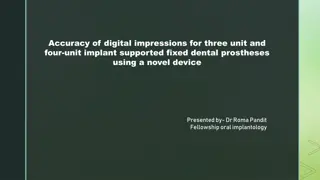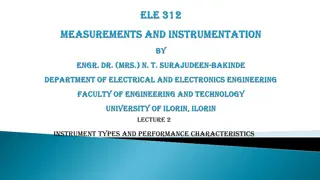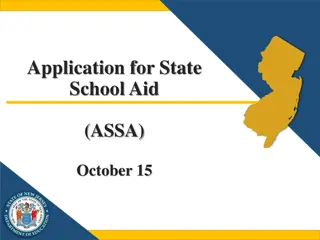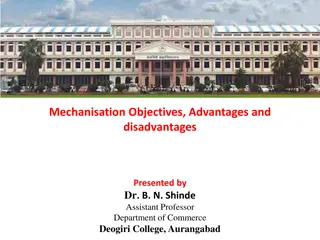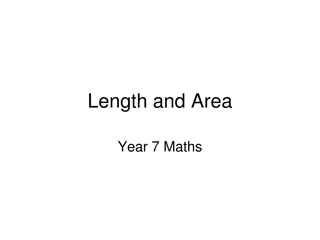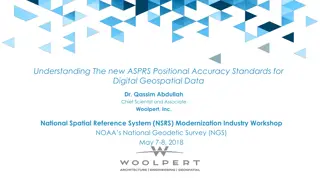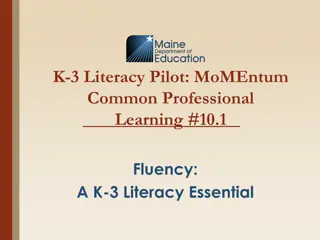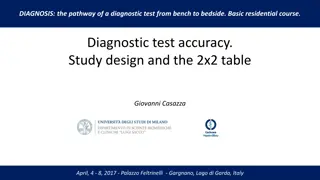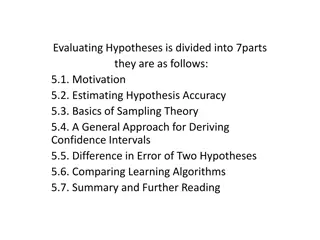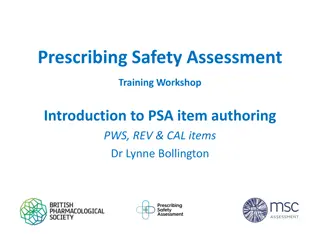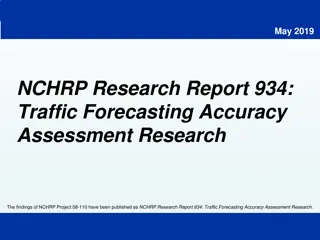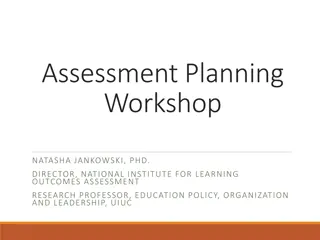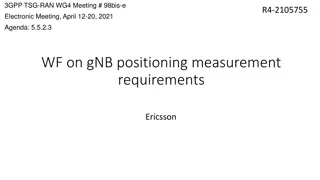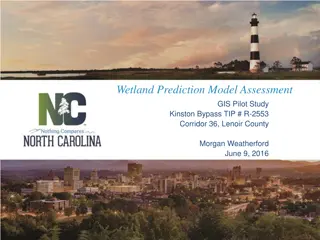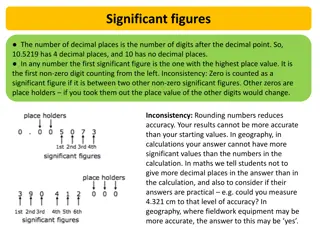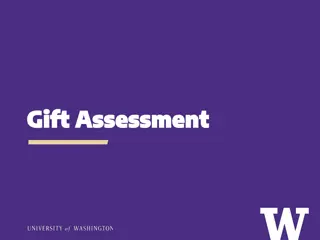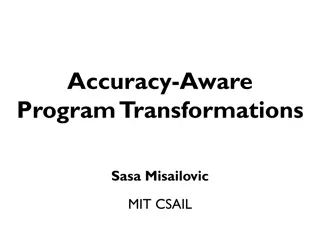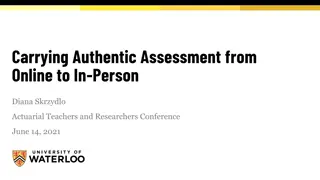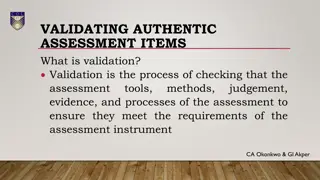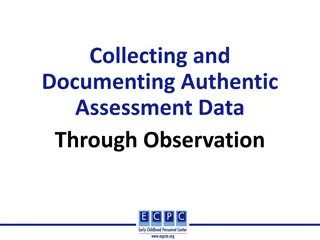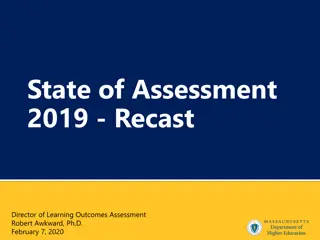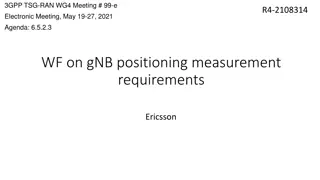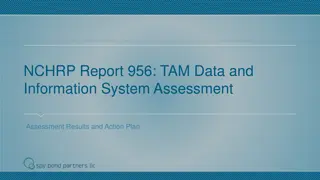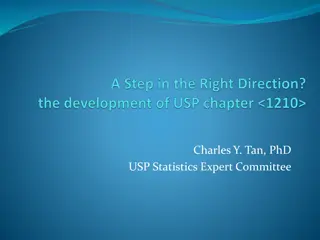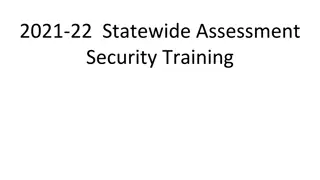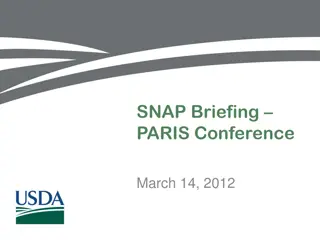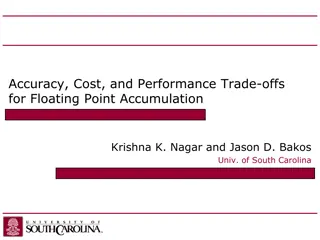Sheffield Early Help Assessment Form Update and Integration with Extended Support Plan
Sheffield has introduced an updated Early Help Assessment form to streamline the assessment process within the Early Help System. This new form combines the Early Help Assessment with the Extended Support Plan, aligning various assessment tools and referral forms into one comprehensive document. The
5 views • 22 slides
Enhancing Language Learning Through Peer Assessment
Explore the benefits of peer assessment as a valuable tool for language learning, comparing it with self-assessment. Discover the components and challenges of self-assessment, along with the potential of peer assessment to improve accuracy and promote self-regulation. Gain insights into what peer as
3 views • 29 slides
Accuracy of Digital Impressions for Implant-Supported Fixed Dental Prostheses
The study presented by Dr. Roma Pandit explores the accuracy of digital impressions for three-unit and four-unit implant-supported fixed dental prostheses using a novel device. Digital impressions offer advantages over conventional methods, but challenges exist in scanning edentulous areas accuratel
0 views • 13 slides
Overview of DSW End Point Assessment Team Leader Level 3
DSW End Point Assessment Team Leader Level 3 provides a clear understanding of the assessment process, ensuring individuals comprehend why and when it occurs, responsibilities involved, and how DSW supports them. It covers topics such as what End Point Assessment entails, assessment design and deliv
1 views • 18 slides
Understanding Instrument Types and Performance Characteristics
This content discusses different types of instruments, including active and passive, null-type and deflection-type, analog and digital, as well as smart and non-smart instruments. It delves into the static characteristics of instruments such as accuracy, precision, tolerance, linearity, and sensitiv
2 views • 39 slides
Managing State School Aid Application (ASSA) for Increased Accuracy
The process for the Application for State School Aid (ASSA) involves submitting data accurately by reviewing and correcting NJ SMART district enrollment reports. District administrators must ensure the correctness of preloaded data in ASSA for final certification. Important guidelines include resolv
0 views • 33 slides
Understanding Mechanisation in Offices: Objectives, Advantages, and Disadvantages
Mechanisation in office work aims to enhance efficiency, reduce monotony, and improve accuracy by introducing machines and equipment. The objectives of office mechanisation include saving labour and time, ensuring accuracy, and reducing errors. Advantages include quality work output, low operating c
2 views • 18 slides
Exploring Length and Area Concepts in Year 7 Maths
Delve into the world of measurements, accuracy limits, and area calculations in Year 7 Math. Learn about the accuracy of measurements, limits of accuracy, calculating the area of shapes, converting units of area, and investigating the area of triangles. Explore practical examples and understand the
0 views • 20 slides
Evolution of ASPRS Positional Accuracy Standards for Geospatial Data
New technological advancements have prompted the need for updated ASPRS positional accuracy standards for digital geospatial data. Legacy standards from the 1990s are no longer sufficient given the shift towards modern mapping technologies. The new era of mapping involves factors like camera calibra
0 views • 21 slides
Enhancing Reading Fluency in K-3 Literacy: Strategies and Techniques
Educators will explore strategies to improve student fluency in reading, focusing on automaticity, rate, accuracy, and prosody. Reading fluency acts as a bridge between word recognition and text comprehension, with four key components: automaticity, rate, accuracy, and prosody. Techniques such as sp
0 views • 20 slides
Diagnostic Test Accuracy Study: Design and Implementation
This content delves into the pathway of a diagnostic test from development to clinical application, focusing on the basic concepts of diagnostic test accuracy, study design, the 2x2 table, and key terminology. It discusses the importance of study design in assessing diagnostic accuracy, including fa
0 views • 16 slides
Understanding Hypothesis Evaluation in Machine Learning
Evaluating hypotheses in machine learning is crucial for assessing accuracy and making informed decisions. This process involves estimating hypothesis accuracy, sampling theory basics, deriving confidence intervals, comparing learning algorithms, and more. Motivated by questions about accuracy estim
0 views • 26 slides
Understanding Assessment in Medical Education
Exploring the concepts of assessment in medical education, including defining assessment, types of assessment, reliability, validity, and aligning assessment methods with intended learning outcomes. The importance of constructive alignment and the impact of assessment on learning outcomes are also d
1 views • 12 slides
Prescribing Safety Assessment - Item Development Process Overview
In the Prescribing Safety Assessment Workshop, item authoring is a crucial process involving multiple stages such as new item creation, editing, peer review, and final assessment board approval. Copy editors and clinical reviewers ensure the accuracy and quality of item content, while peer reviewers
0 views • 32 slides
Assessment Matters in Sociology: Enhancing Learning Through Evaluation
Explore the significance of assessment in sociology education, focusing on key questions to evaluate current assessment procedures, review individual course assessments, and develop strategies to enhance student learning outcomes. Delve into the centrality of assessment in the learning process, with
1 views • 15 slides
NCHRP Research Report 934: Traffic Forecasting Accuracy Assessment Research
The NCHRP Research Report 934 focuses on analyzing and improving the accuracy, reliability, and utility of project-level traffic forecasts in the U.S. The study aims to address the significant knowledge gap in travel demand modeling related to urban road traffic forecasts. Key objectives include ass
0 views • 24 slides
Insights into Managing Assessment in the Classroom by Assessment Research Group
Explore the importance of standards and assessment in education through the lens of the Assessment Research Group. Gain valuable perspectives on curriculum delivery, understanding the assessment system, learner assumptions, task parameters, and more. Discover how language, structure, and agency play
2 views • 25 slides
Workshop on Assessment Planning by Dr. Natasha Jankowski
Dr. Natasha Jankowski, Director of the National Institute for Learning Outcomes Assessment, conducts a workshop focusing on effective use of assessment data to enhance undergraduate education. The workshop covers areas like evaluating assessment plans, program learning outcomes, and assessment rubri
0 views • 30 slides
gNB Positioning Measurement Requirements Discussion at 3GPP TSG-RAN WG4 Meeting
Discussion at the 3GPP TSG-RAN WG4 meeting #98bis-e focused on gNB positioning measurement requirements, including beam sweeping, gNB accuracy requirements, samples for gNB accuracy, RoAoA side conditions, and SRS-RSRP measurement accuracy requirements. The meeting addressed various candidate option
1 views • 14 slides
Enhancing Understanding through Assessment in Educational Design Workshop
Learn and collaborate on assessment practices in education design at the "Understanding by Design Assessment Focus" workshop. The agenda includes sessions on summative and formative assessment, feedback, reporting, and more. Engage in activities like generating questions, finding destination partner
1 views • 76 slides
Wetland Prediction Model Assessment in GIS Pilot Study for Kinston Bypass
Wetland Prediction Model Assessment was conducted in a GIS pilot study for the Kinston Bypass project in Lenoir County. The goal was to streamline project delivery through GIS resources. The study focused on Corridor 36, assessing various wetland types over a vast area using statistical and spatial
0 views • 16 slides
Institutional Assessment Planning Workshop Feedback and Insights
Feedback and insights from a recent institutional assessment planning workshop led by Dr. Mark Nicholas at FSU S. Warren Conference Center & Inn. Participants provided feedback on the usefulness of the content, presenter knowledge, ability to develop assessment plans, post-training assessment knowle
1 views • 9 slides
Understanding Significant Figures in Mathematics and Science
Significant figures play a crucial role in maintaining accuracy and precision in mathematical and scientific calculations. They help in determining the level of accuracy of measurements and calculations by focusing on the number of significant digits and decimal places. Rounding rules are essential
0 views • 6 slides
Understanding Higher Education Assessment: The Complete Guide
Higher education assessment involves a systematic process of collecting, reviewing, and utilizing information to improve student learning and development. This guide covers the assessment cycle, learning outcomes, the mission behind assessment in higher education, what assessment is and is not, reas
1 views • 36 slides
Understanding Gift Assessment Process at University of Washington
The Gift Assessment Process at University of Washington involves applying a 5% assessment to select current-use gifts over $1,000 and under $5 million. This assessment supports the university's advancement efforts and institutional priorities by transferring 5% of eligible contributions to the Provo
1 views • 5 slides
Overview of Environmental Impact Assessment and Strategic Environmental Assessment Directives
Environmental Impact Assessment (EIA) and Strategic Environmental Assessment (SEA) play crucial roles in evaluating the impact of planned activities on the environment. This content delves into the concept, origins, development, and key elements of environmental assessment, discussing the legal fram
2 views • 35 slides
Accuracy-Aware Program Transformations for Energy-Efficient Computing
Explore the concept of accuracy-aware program transformations led by Sasa Misailovic and collaborators at MIT CSAIL. The research focuses on trading accuracy for energy and performance, harnessing approximate computing, and applying automated transformations in program optimization. Discover how to
0 views • 20 slides
Institutional Assessment and Effectiveness Workshop Achievements at SUNY Oneonta
The Office of Institutional Assessment and Effectiveness at SUNY Oneonta has made significant progress in developing assessment protocols and processes, leading to a culture of assessment. This includes completing planning and assessment cycles, establishing objectives and procedures, and aligning u
1 views • 16 slides
Oregon Department of Education Assessment and Accountability Resources
Access important information on assessments, accountability, and reporting from the Oregon Department of Education. Find resources on updating assessment records, accessing student scores, and staying informed about assessment requirements for the 2023-24 academic year. Explore links for assessment
0 views • 55 slides
Oregon Department of Education - Assessment Resources and Updates
Explore the Assessment Record Updating Application (ARUA), Accountability Warehouse Extract (AWE), Secure Assessment Reports, and other important tools and information provided by the Oregon Department of Education for assessment data owners, analysts, and partners. Access links for assessment admin
0 views • 54 slides
Enhancing Teaching Assessment for Actuarial Education
Exploring the transition of assessment practices from online to in-person settings, this presentation by Diana Skrzydlo at the Actuarial Teachers and Researchers Conference delves into the purpose of assessment, key principles, and activities for effective evaluation. Discover insights on diagnostic
0 views • 10 slides
Understanding Validation in Authentic Assessment Items
Validation in authentic assessment items is crucial for ensuring the quality and effectiveness of assessment tools. It involves a thorough review process to confirm that the test items are valid, reliable, and produce authentic evidence for making sound judgments. Various aspects of validation, incl
0 views • 29 slides
Authentic Assessment through Systematic Observation: Best Practices
Explore the process of authentic assessment through systematic observation in early childhood education. Learn about collecting, documenting, and interpreting assessment data using evidence-based practices and technology. Discover the importance of working collaboratively with families and professio
0 views • 53 slides
Assessment Practices in Higher Education Institutions
Dive into the state of assessment for the year 2019, featuring insights on hosting assessment days, establishment of assessment committees, implementation of institutional and program learning outcomes, appointment of a Director of Assessment, compensation for faculty members focusing on assessment,
0 views • 8 slides
3GPP TSG-RAN WG4 Meeting #99-e Electronic Meeting Agenda
The 3GPP TSG-RAN WG4 meeting #99-e electronic meeting held on May 19-27, 2021 discussed gNB positioning measurement requirements, SRS-RSRP accuracy requirements, beam sweeping during gNB measurement, impact of SRS/IoT on accuracy, RF margin for SRS-RSRP, and gNB Tx accuracy requirements. The meeting
0 views • 9 slides
NCHRP Report 956 TAM Data and Information System Assessment
This content provides an overview of NCHRP Report 956 focusing on the TAM data and information system assessment results and action plan. It includes details on assessment outcomes, recommendations, implementation action plans, and tools for self-assessment and improvement methodology. The content a
0 views • 21 slides
Statistical Tools for Method Validation in USP General Chapter 1210
In the USP General Chapter 1210, Statistical Tools for Method Validation are outlined, serving as a companion to the validation of Compendial Procedures. The chapter covers important topics like Accuracy, Precision, Linearity, LOD, LOQ, and range. It emphasizes statistical tools such as TOST, statis
0 views • 22 slides
Essential Guidelines for Statewide Assessment Security Training
This resource outlines key objectives for successful test administration, test security standards, accommodation resources, and responsibilities for building coordinators and test administrators. It emphasizes the importance of adhering to test security measures to ensure the accuracy and integrity
0 views • 20 slides
SNAP Client Integrity and Payment Accuracy Highlights
The SNAP (Supplemental Nutrition Assistance Program) conference in Paris on March 14, 2012, covered topics such as client integrity and payment accuracy. The focus was on combating recipient fraud and ensuring accurate benefit distribution. Troubling activities like the sale of EBT cards and unexpla
0 views • 23 slides
Trade-offs in Floating Point Accumulation: Balancing Accuracy, Cost, and Performance
When designing floating point accumulation systems, achieving high throughput and accuracy presents a challenging trade-off. Inconsistent accuracy due to data dependencies can lead to significant errors in results. Strategies such as compensated summation or using extended precision adders can help
0 views • 11 slides


